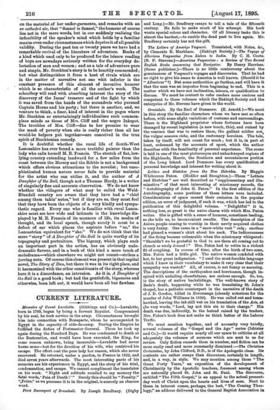Letters and Sketches from the New Hebrides. By Maggie Whitecross
Paton. (Hodder and Stoughton.)—These "Letters and Sketches" are well described as "supplementary and illu- minative " of that most interesting of missionary records, the "Autobiography of John G. Paton." In the first edition of the Autobiography, some portions of these letters were included. Considerations of space caused their omission in the popular edition, an error of judgment, if such it was, which has led to the publication of this delightful volume. " Delightful" it is, nothing less, so great is the naive charm with which Mrs. Paton, writes. She is gifted with a sense of humour, sometimes leading,. as she tells us, to inconvenient results. The description of the Aniwa people coming to worship in their newly acquired clothes is very funny. One came in a " snow-white vest" only; another had pinned a woman's skirt about his neck. The ludicrousness of the thing became unbearable when the missionary whispered: "Shouldn't we be grateful to God to see them all coming out to. church so nicely dressed ! " Mrs. Paton had to retire in a violent fit of coughing. In course of time, after the birth of two sons,. Mrs. Paton had a little girl. The native women condoled with her, to her great indignation. "I used the most forcible language which I knew in their vocabulary to make it very clear that their sympathy was wasted." AU, of course, is not funny or amusing. The descriptions of the earthquakes and hurricanes, though in- spired with unfailing cheerfulness, are serious enough. So, too, is the story of native backslidings. The well-known story of Bede's death, happening while he was translating St. John's Gospel, has a pathetic counterpart in the narrative of the death of J. D. Gordon, killed in Erromanga (already notorious for the murder of John Williams in 1839). He was called out and toms- hawked, leaving the ink still wet on his translation of the Acts, at the very words, " Lord, lay not this sin to their charge." His death was due, indirectly, to the hatred raised by the traders. Mrs. Paton's book does not make us think better of the Labour Traffic.


































 Previous page
Previous page